By Megan Ng
“Detox” and “cleanse” are health buzzwords that are frequently associated with the liver and its role in our body. With those connections being drawn constantly, it is understandable for many of us to believe that the liver is only capable of those two functions. Although the liver does filter waste from our bloodstream, it has many other responsibilities that span our body. Being aware of what other operations the liver is involved in is crucial in understanding and preventing harm, disease development, and risk.
What Does the Liver Do?
The liver is the largest solid organ in the body. It removes toxins from the body’s blood supply, maintains healthy blood sugar levels, regulates blood clotting, and performs hundreds of other vital functions (Columbia Surgery, n.d.). Some of these other functions include: (Kalra et al., n.d.); (Columbia Surgery, n.d.)
- Bile production
- Fat-soluble vitamin storage and metabolism
- Drug metabolism
- Bilirubin metabolism
- Synthesis of nearly every plasma protein in the body, some examples include albumin and binding globulins.
So…Do Cleanses Provide Extra Help?
Many companies that advertise for juice cleanses or tea detoxes often claim that they are necessary to “reset” your body, or to strengthen liver and kidney function. However, many of these claims are unfounded and have little research to support them. These cleanses are often full-liquid diets and are restrictive which can do more harm than good (Woreta, n.d.). This is especially the case for those who may have pre-existing medical conditions. To answer the question, the body’s built-in “detox” system consisting of the kidneys, lungs, skin, liver, and digestive tract does a great job all on its own (Woreta, n.d.).
Even though the body is self-detoxing, you can support these efforts by eating a balanced diet and reducing exposure to known toxins.
This can look like… (Nivukoski et al., 2020); (Columbia Surgery, n.d.)
- Avoiding illicit drugs. Frequent drug use creates more toxins that the liver must filter out which can cause damage, especially in large, constant doses (Almazroo et al., 2017).
- Drinking alcohol in moderation. Alcohol is broken down by the liver. While the liver can moderate amounts, excessive alcohol use can lead to alcoholic fatty liver.
- Exercise regularly. A regular exercise routine will help promote general health for every organ, including the liver.
- Prioritizing nutrition. A poor diet combined with increased weight gain can lead to fat accumulation in the liver, fatty liver disease, and other chronic diseases.
- Practicing safe sex. Use protection to avoid sexually transmitted diseases such as hepatitis C.
- Especially when traveling, get appropriate vaccinations against hepatitis A and B, as well as diseases such as malaria and yellow fever, which grow in the liver.
Summary
The liver is an efficient organ capable of a variety of functions that include “cleansing” itself. As a result, an additional external cleansing supplement is usually not needed. To ensure proper liver health and function, adhering to a healthful lifestyle will be your best defense against developing liver diseases as well as other disease states.
To learn more about nonalcoholic fatty liver disease, watch the on-demand webinar “Strategies for the Management of Nonalcoholic Fatty Liver Disease“.
References
- Almazroo, O. A., Miah, M. K., & Venkataramanan, R. (2017). Drug Metabolism in the Liver. Clinics in liver disease, 21(1), 1–20. https://doi.org/10.1016/j.cld.2016.08.001
- Columbia Surgery. (n.d.). The Liver and Its Functions. Liver Functions, Location, Anatomy and Disease | Columbia Surgery. Retrieved April 20, 2023, from https://columbiasurgery.org/liver/liver-and-its-functions
- Kalra, A., Yetiskul, E., Wehrle, C. J., & Tuma, F. (n.d.). Physiology, Liver. National Library of Medicine. Retrieved April 20, 2023, from https://www.ncbi.nlm.nih.gov/books/NBK535438/
- Nivukoski, U., Niemelä, M., Bloigu, A., Bloigu, R., Aalto, M., Laatikainen, T., & Niemelä, O. (2020). Combined effects of lifestyle risk factors on Fatty Liver index. BMC Gastroenterology, 20(1). https://doi.org/10.1186/s12876-020-01270-7
- Woreta, T. A. (n.d.). Detoxing your liver: Fact versus fiction. Detoxing Your Liver: Fact Versus Fiction. Retrieved April 20, 2023, from https://www.hopkinsmedicine.org/health/wellness-and-prevention/detoxing-your-liver-fact-versus-fiction
Megan Ng is a Graduate Student of Food Science and Human Nutrition at the University of Illinois at Urbana Champaign













